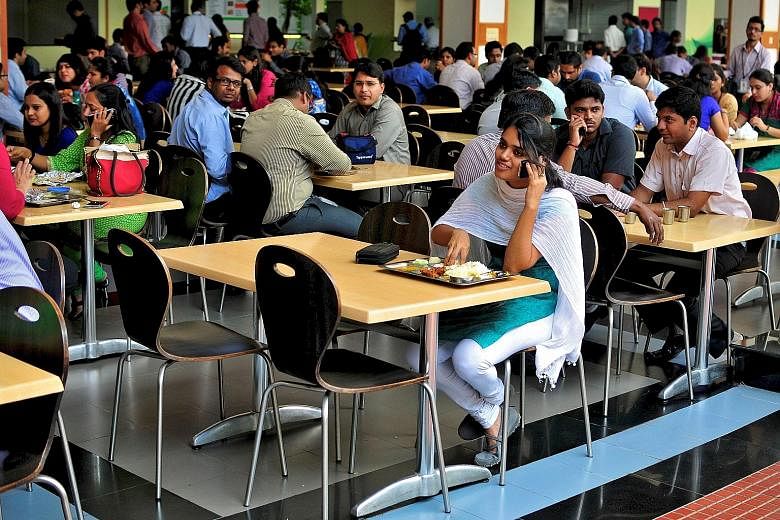As the United States looks at tightening visa rules for skilled foreign workers, concerns are mounting that India's software industry will take a hit.
US President Donald Trump has drafted a proposal to tighten work visa programmes, including the H-1B visa which is used by Indian software companies to send Indian engineers to the US. Legislation was also introduced in the US Congress late last month, raising minimum salaries under the H-1B work visa scheme from US$60,000 (S$85,300) to US$100,000 a year.
Experts believe that any tinkering of the work visa programmewill push up costs, affecting not just India's sizeable software industry but also US firms that use these services. As many as 85,000 H-1B visas are issued by the US authorities every year, with most going to skilled workers from India.
Top Indian IT companies get as much as 60 per cent of their revenue from the US. "If visas are reduced or banned, there will be a deep impact over time for service providers, though new technology could mitigate part of the impact," said Mr Mohandas Pai, a tech investor and former director of Infosys.
India's outsourcing industry has grown over the last three decades as Western companies farm out maintenance work to India, which provides cheap labour. Indian software companies such as Wipro, Tata Consultancy Services and Infosys in turn send their engineers to the US for projects under the work visa. There are currently over 300,000 Indian engineers working for clients in the US.
The National Association of Software and Services Companies (Nasscom) will send a delegation to the US to lobby for industry interests later this month. A Nasscom official said the US faces a shortage of people with requisite skills, a point the association will make to the Trump administration.
"The US Department of Labour stated that there will be 2.4 million unfilled Stem (science, technology, engineering and mathematics) jobs by 2018, more than 50 per cent are in computer and IT-related areas. That is the gap that needs to be bridged," said Mr Shivendra Singh, vice-president and head of global trade development at Nasscom.
-
US$118b
Value of India's IT outsourcing industry (S$167 billion)
-
4m
Number of people employed by the industry
-
60%
Percentage of revenue which comes from the US market
"We are a net creator of jobs bringing value to American corporates and the American economy."
News of the legislation to raise minimum salaries has already been felt, with shares of IT companies falling last week.
The threat of protectionism has been hanging over the software industry for some time, with some companies already looking for newer markets in Latin America. Tata Consultancy Services, for example, said it applied for 14,000 US work visas in 2015 but only 2,000 last year.
Some believe that increasing local hires in the US could help remove the perception of the industry being just a provider of cheap back-office work. Others believe the tightening of visa rules will push Indian firms towards high-end offerings sooner.
"They have to get into high-value services like machine-learning automation and minimise dependence on just onsite services," said Mr Ramesh Loganathan, former president of Hyderabad Software Enterprises Association.
"Still, what would have taken five years will now happen in two years due to protectionism."

